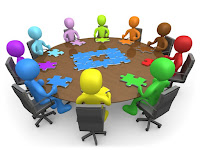Hey everyone,
I do not know about you guys, but when I work in a team setting, sometimes things can become a little bit competitive. I always want to be in charge of putting the final project together, and making sure I receive everyone's part of the assignment at a certain point. I like how people get their job done fast because that is what I do. I never procrastinate.

However, sometimes you work in groups where not everyone is like you. There may be some slow people in your group that need time to catch up. You all have to work together as a team. By being a team, that means you need to collaborate. Collaboration means working with someone to create something. It is crucial that you work together with your team and not to compete with each other. Competition leads to bickering, fighting, people in the group taking sides, etc. This leads to your task/project not resulting in a good manner. Parts of your assignment may end up sloppy, or incomplete.
"Sharing information in a cooperative effort to achieve team purpose must be more important than competing with other members for individual achievement." (Business Communication, 2016, pg.41)
This quote essentially means that you are working as a group; not by yourself. You need the support of your team to develop an excellent task/project.
During this collaboration effort, there may also be a leader assigned to your group. Now leaders are good, they keep everyone on track, and make sure people are assigned roles that best suit their strengths. A leader is often someone with the most expertise and is good at taking charge. Although having one leader is important, sometimes it is necessary to point other people as leaders. (Business Communication, 2016, pg.41) If you are working on a task where someone has more knowledge about the topic, you should let that person be the leader.
Sharing the role of leadership allows everyone to have input on the task and lets people of the group gain confidence.
 While working in a team, it is critical for all members to feel like they have a say in group discussions. It is important to make decisions together so that the end project that you are working towards has valuable information. If there is a problem, the team should address it without fighting or taking sides. You need resolve conflict by utilizing the six steps mentioned in a previous post. This way, each member wins.
While working in a team, it is critical for all members to feel like they have a say in group discussions. It is important to make decisions together so that the end project that you are working towards has valuable information. If there is a problem, the team should address it without fighting or taking sides. You need resolve conflict by utilizing the six steps mentioned in a previous post. This way, each member wins.










